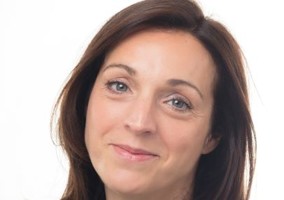Dealing with change was inevitable during the Covid-19 pandemic, and particularly for NHS Charities Together, which went from a small membership body to a multi-million-pound organisation over the course of a few weeks.
Since Orton joined the charity in 2018, it has gone from having three members of staff to more than 60.
When the pandemic hit and the UK was forced into lockdown in March 2020, the charity’s then team of three was repeatedly asked if it would be launching a national fundraising appeal.
“It was daunting, but it was daunting for everybody everywhere,” Orton says.
Leading in a crisis
Despite never having run a fundraising campaign before, Orton lead the charity into launching its NHS Covid-19 Urgent Appeal.
The appeal raised over £15m in the first five days, including a £10m donation from XTX Markets and £5m from the Julia and Hans Rausing Trust. It eventually drew in £160m, £38m of which was from Captain Tom Moore’s fundraising.
Reflecting on the appeal, Orton remembers being daunted as she felt like: “People were coming to me saying: ‘Are you going to have a national appeal?’ And I said: ‘Yes, we are. I don’t know what to do, can you please help?’
“What I did then was build a team around me of people that did know what they were doing. Nobody had done this before like this, this had never happened in the country before. But it was very much an absolute belief that this was the right thing to do and that we were the right organisation to do it.”
“The thing with being daunted is I don’t think it should actually stop anybody from doing anything. But you should absolutely know what your gifts are, what your skills are, what your values are, what you can and can’t do, and then build the team around you so that you can.
“I think asking for help is probably one of the biggest leadership behaviours that anybody should have.”
In May, the charity reported that 93% of the funds from the appeal had been distributed.
On the remaining £12m, Orton says: “We are soon to launch some exciting new programmes for the sector, where the remaining funds will be invested in the long-term recovery of the NHS, for the future benefit of staff, volunteers, patients and communities.”
‘Planning for significant growth’
Three years on from the appeal, the charity now plans for further “significant growth”, which it aims to achieve by diversifying its income.
The charity’s strategy for the next five years sets out the aim of maximising its impact by working with member organisations and other NHS bodies to create greater change.
Orton says the charity will focus on “mobilising and growing the sector, building our collective capacity, and leading new initiatives that address challenges with infrastructure and ensure NHS charities a seat at the table”.
“What we want to achieve as a charity is ambitious, and we are planning for significant growth to support the delivery of our new strategy, but it’s a challenging time for all fundraisers and as a new fundraising organisation we are still testing, learning and shaping our income strategy,” she says.
Since its Covid appeal, NHS Charities Together has developed a regular giving offer, a national legacy campaign and is continuing to partner with other healthcare organisations.
It also runs annual fundraising event NHS Big Tea, where members of the public fundraise by gathering together to have tea and cake.
In its fifth year, the fundraising event was in celebration of the NHS’s 75th birthday last month.
Orton says the charity is considering hiring more staff to achieve the targets sets out in its strategy, to which 70% of its 230 NHS member charities contributed.
Building psychological safety
As a charity that has expanded a lot in recent years, NHS Charities Together has been focusing on its employees’ wellbeing, particularly their “psychological safety”.
Psychological safety means being free to ask questions and make suggestions about the way the charity is run, Orton says.
“We need to have psychological safety for people to say actually, this isn’t okay or it doesn't work or we need to improve on this bit, and making it okay for people to say those things.
“Psychological safety isn’t about all being rosy and fine. It’s about people knowing they are going to be listened to and that they can share their experiences. It’s about making it okay to ask the question or to put an idea out, that nobody’s going to them that it’s not their place.
“I do think psychological safety is really important in all organisations. Because the best ideas don't necessarily come from the senior leadership team or the CEO or whoever. Some of the best ideas are from somebody who is working on data.”
Employees at NHS Charities Together have the option to have two hours of “wellbeing time out” on Friday mornings, which Orton says has had a “very positive impact” on staff’s mental health.
“We work quite hard on making sure that we embed our values and are clear about our behaviours. Do I say that we’ve got it right and that we’re perfect? Absolutely not. It’s a constant thing on the agenda – we are making sure that we live this. So, it’s a constant learning cycle for the organisation.”
NHS charities ‘won’t replace government funding’
One of the challenges the charity faces is the “highly politicised” narratives around the NHS, she says.
When asked about the public opinion that NHS should not be subsidised by charity, Orton says there are a couple of ways the charity responds to this view.
“The NHS doesn’t work in a silo. It never has. It absolutely relies on its relationship with the voluntary sector.
“NHS charities are a way to be able to help the NHS engage with the wider voluntary sector but also to bring in vital extra funds to help it go further”.
Despite the collective income of NHS charities accounting for around 1% of all the government funding the healthcare service receives, NHS charities can still make a big difference, Orton says.
“Income of NHS charities nationally is never going to replace government funding. It's 1% of all government funding. But actually, we can make a massive tangible difference to patients, to staff and to communities.”
Editor's note
This article has been edited to correct the statement that Sigrid Rausing Trust gave a £5m donation to the NHS Charities Together Covid-19 Appeal. This was, in fact, donated by the Julia and Hans Rausing Trust.
Related articles











